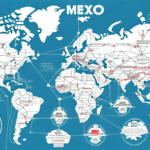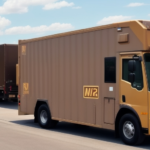Understanding UPS Rates for International Shipping
If you're in the business of selling products internationally, one of the most significant considerations you'll face is choosing a reliable shipping provider. One such provider is UPS, renowned for its dependable and swift delivery services. However, many businesses often find it challenging to decipher UPS rates for international shipping. In this article, we'll delve into the key factors to consider when determining the cost of an international shipment with UPS.
Comparing UPS Shipping Rates for Different Countries
UPS international shipping rates can vary substantially depending on the destination country. This variation arises from each country's unique customs laws, taxes, and duties, which influence the overall cost of each shipment. Generally, countries with stricter customs regulations may incur higher shipping rates.
Businesses should:
- Compare rates across different countries to identify the most affordable and profitable shipping destinations.
- Consider the specific customs regulations of each country, as they can significantly impact shipping costs.
Additionally, UPS offers various shipping options tailored to different countries. For instance, some destinations may offer faster delivery options at a higher cost, while others might provide slower but more economical alternatives. It's essential for businesses to assess the urgency of their shipments and the cost-effectiveness of each shipping option when comparing rates.
Determining the Weight and Size of Your Package for International Shipping
The weight and size of your package are crucial determinants of UPS international shipping costs. Heavier and larger packages typically incur higher rates. Therefore, accurately measuring and weighing your package is vital to avoid unexpected fees, delays, and additional charges.
Key considerations include:
- Accurate Measurements: Ensure you include the weight of all contents and packaging materials.
- Volumetric Weight: UPS uses a volumetric weight calculation for packages that are lightweight but occupy significant space. This calculation considers the package's dimensions to determine its billing weight.
- Weight and Size Restrictions: UPS imposes specific weight and size limits that vary by country. Always check these restrictions before shipping.
Moreover, understanding the destination country's customs requirements is essential. Some countries have stringent regulations on what can be shipped, and non-compliance can lead to delays or the return of the package to the sender. Researching and adhering to these requirements ensures a smoother shipping process.
Understanding UPS Customs Duties and Taxes for International Shipments
Customs duties and taxes are additional fees levied by the destination country on incoming shipments. These charges are typically based on the product's value and country of origin. UPS provides online tools to help businesses estimate these fees, which should be factored into your overall shipping budget to prevent unexpected costs or delays.
Consider the following:
- Variation by Country: Duties and taxes can differ significantly between countries and even within regions of the same country.
- Product-Specific Rates: Some countries impose higher tariffs on certain product categories, while others may offer exemptions or preferential rates under specific trade agreements.
It's crucial to thoroughly research and understand the customs regulations of each destination country to ensure compliance and avoid potential penalties or legal issues.
Tips for Saving Money on UPS International Shipping Rates
There are several strategies to reduce UPS international shipping costs:
- Bundle Shipments: Consolidating multiple shipments can lead to bulk discounts.
- Negotiate Rates: Engage with UPS representatives to negotiate better rates based on your shipping volume.
- Select Cost-Effective Shipping Options: Opt for longer delivery windows or choose less expensive shipping methods like ground or sea freight for non-urgent shipments.
- Use Shipping Calculators: Compare rates from different carriers using UPS's shipping calculator to find the most cost-effective option.
- Leverage Loyalty Programs: Utilize UPS's loyalty programs to access discounts and rewards for frequent shippers.
Additionally, ensuring that your packages are properly packaged and labeled can prevent additional fees or delays. Investing in quality packaging materials and clear labeling helps ensure that shipments arrive safely and on time.
Understanding UPS International Shipping Restrictions and Regulations
Every country has its own set of shipping restrictions and regulations, making it essential to research the destination country's laws regarding the shipment of specific products. For example, items like alcohol, weapons, or pharmaceuticals may face strict regulations or outright bans, leading to additional fees or the impoundment of shipments at customs.
To navigate these complexities:
- Research Restrictions: Familiarize yourself with the destination country's restrictions on specific products.
- Quantity Limits: Some countries limit the quantity of certain products, such as tobacco or alcohol, that can be shipped in a single package.
- Documentation: Ensure you have all necessary documentation or permits for restricted items, like live animals or plants.
Complying with these regulations helps avoid delays and additional costs associated with non-compliance.
Tracking Your UPS International Shipment
One of UPS's standout features is its real-time tracking capabilities. Businesses can monitor their international shipments continuously, receiving updates on package locations and notifications of any delays or issues. This transparency allows businesses to keep their customers informed, enhancing customer service and fostering loyalty.
Benefits of UPS tracking include:
- Customizable Notifications: Choose to receive updates via email, text message, or through the UPS mobile app.
- Analytical Tools: Utilize tracking tools and reports to analyze shipping data, identify cost-saving opportunities, and optimize shipping processes.
By leveraging these tracking features, businesses can improve delivery times, manage shipping costs, and enhance overall efficiency.
Choosing the Right Packaging Materials for Your UPS International Shipment
The packaging materials you select for your UPS international shipment significantly impact the package's weight, size, and safety during transit. Proper packaging ensures that your products are protected and can help minimize the likelihood of damage.
Consider the following when selecting packaging materials:
- Lightweight and Durable Materials: Use materials that provide adequate protection without adding unnecessary weight.
- Compliance with Destination Regulations: Some countries have strict guidelines on packaging materials. Ensure your packaging complies with these regulations to avoid delays or rejections.
- Eco-Friendly Options: Opt for sustainable packaging materials, such as biodegradable or recycled content packaging, to reduce your carbon footprint and appeal to environmentally conscious customers.
Understanding the Options for UPS International Express Shipping
UPS offers several express shipping options tailored to businesses requiring fast and reliable delivery services. These options include:
- UPS Worldwide Express
- UPS Worldwide Saver
- UPS Worldwide Expedited
Each option provides different delivery windows and rates. It's essential to evaluate these options to determine which aligns best with your business needs and budget.
Properly Labeling Your UPS International Shipment
Accurate labeling is critical for ensuring your international shipment with UPS arrives on time and without issues. Your shipping label should include:
- The recipient's full name and address.
- Your return address.
- Appropriate customs information.
Additionally, certain products, such as dangerous goods, require specific labeling as per UPS guidelines. Researching these requirements beforehand ensures compliance and prevents delays.
Understanding the Delivery Times of UPS International Shipments
Delivery times for UPS international shipments vary based on several factors, including the destination country, chosen shipping option, and customs clearance times. UPS provides online tools to estimate delivery times, which businesses should utilize to manage customer expectations effectively.
Key points:
- Shipping Options: Faster shipping options generally cost more but ensure quicker delivery.
- Customs Clearance: Delays can occur if customs processes take longer than expected.
Familiarizing yourself with these factors helps in planning and ensures timely delivery to your customers.
Tips for Avoiding Common Mistakes When Using UPS for International Shipping
International shipping with UPS can be complex, and businesses often make common mistakes that lead to increased costs and delays. To avoid these pitfalls:
- Accurate Weight and Measurements: Ensure all packages are correctly weighed and measured to avoid unexpected fees.
- Proper Labeling: Double-check that all labels are clear, accurate, and compliant with UPS requirements.
- Research Customs Regulations: Stay informed about the destination country's customs laws to prevent non-compliance issues.
By addressing these areas proactively, businesses can streamline their international shipping processes and enhance overall efficiency.
The Importance of Insurance When Using UPS for International Shipping
Insurance plays a pivotal role in safeguarding your shipments against potential losses or damages during transit. UPS offers various insurance coverage options to protect businesses, especially when shipping high-value items.
Consider the following:
- Assessing Coverage Needs: Evaluate the value of the products you're shipping to determine the appropriate level of insurance coverage.
- Additional Insurance: Depending on the shipment's value, you might need to invest in supplementary insurance to ensure comprehensive protection.
Having adequate insurance coverage provides peace of mind and financial protection in case of unforeseen events during shipping.
Navigating Language Barriers When Using UPS for International Shipping
Language barriers can pose significant challenges in international shipping, affecting communication with customers and customs officials. UPS offers translation services to assist businesses in overcoming these obstacles.
Strategies to address language barriers include:
- Utilize UPS Translation Services: Take advantage of UPS's online translation tools for accurate communication.
- Hire Bilingual Staff: Employ staff members proficient in the destination country's language to facilitate smoother interactions.
- Partner with Translation Services: Engage professional translation services to ensure all documentation and communication are accurate.
Effective communication is essential for ensuring that shipments are processed correctly and reach their intended destinations without delays.
Handling Returns and Exchanges with UPS International Shipments
Managing returns and exchanges in international shipping can be intricate. It's vital to have a well-defined returns policy and communicate it clearly to your customers.
Best practices include:
- Clear Returns Policy: Define the terms and conditions for returns and make them easily accessible to customers.
- Shipping Returns: Decide on the preferred shipping method for returns and ensure it aligns with your customers' needs.
- Customs Compliance: Understand and comply with customs regulations related to returns to prevent delays or additional fees.
Having a streamlined process for handling returns and exchanges enhances customer satisfaction and fosters trust in your brand.
Understanding UPS rates for international shipping can be complex, but by considering the factors outlined in this article, businesses can make informed decisions when shipping products overseas. By weighing the costs and benefits of using UPS for international shipping, businesses can maximize their profits and provide high-quality customer service to their customers around the world.



















